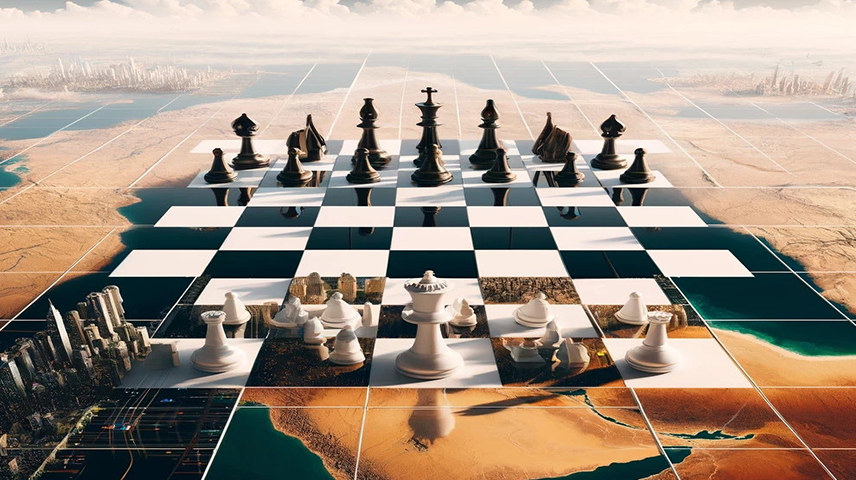The Importance of A Grand Strategy for Middle Powers
In the face of emerging superpower competition, regional middle powers risk marginalization. To avoid becoming mere spectators, these nations must adopt a proactive approach. Developing a robust 'grand strategy' can empower them to shape their own destinies and play a pivotal role in the evolving global order.
Contemporary political discourse cannot ignore the significance of grand strategies for states. While this concept was initially reserved for major powers, the increasing complexity of global challenges and the emergence of new threats have highlighted the need for even mid-sized or middle powers to develop comprehensive strategic plans. The United States itself recognizes the importance of understanding how middle powers might shift alliances in a multipolar world and has called for a specific grand strategy to address this challenge.
Competing Paradigms in International Relations
Competing paradigms within international relations offer divergent conceptualizations of grand strategy. Realists contend that a state's strategic calculus is primarily shaped by the anarchical nature of the international system and the inherent self-preservation instinct of human nature. For them, great powers are the principal actors, compelled to pursue either survival or hegemony in a world devoid of overarching authority.
In contrast, liberal thought underscores the potential for inter-state cooperation. Liberalism, in its various iterations, has championed normative ideals such as the universalization of democracy, as exemplified by the post-World War II order and the subsequent neoconservative project. Alternatively, a more institutionalist strain of liberalism prioritizes the construction of multilateral frameworks to undergird global stability, often relying on the implicit leadership of dominant states. The juxtaposition of these perspectives generates ambiguity surrounding the efficacy and morality of grand strategy. Germany's historical experience serves as a stark reminder of the perilous consequences of misapplying geopolitical principles, a legacy that continues to shape the nation's approach to such concepts.
Defining A Grand Strategy: The Art of Balancing Ambitions and Resources
At its core, grand strategy is the art of aligning a nation's aspirations with its capabilities. As defined by renowned Cold War historian John Lewis Gaddis, it involves reconciling "potentially unlimited ambitions with necessarily limited resources." Gaddis, often referred to as the "Dean of Cold War Historians," has profoundly influenced the field with his work on grand strategy and the Cold War.
The Fox and Hedgehog Approach to Grand Strategy
Gaddis introduced a useful dichotomy to describe different approaches to grand strategy. "Foxes" are strategic thinkers who excel at gathering information, analyzing complex situations, and adapting to changing circumstances. They are often found in research institutions and think tanks. In contrast, "hedgehogs" have a limited worldview and tend to pursue a single, overarching idea, often neglecting the nuances of a complex reality. To develop a successful grand strategy, a nation must strive to be more like a fox. This involves conducting thorough research, considering multiple perspectives, and being prepared to adjust plans as circumstances evolve. By contrast, a hedgehog-like approach can lead to rigid, inflexible strategies that are vulnerable to unforeseen challenges.
The Growing Consensus on the Need for Grand Strategies
Applying the preceding discussion to current global transformations reveals a growing consensus that different countries need grand strategies today. This need is recognized by policymakers, politicians, and intellectuals alike. Without a grand strategy, a state will be limited to short-term planning, and different government agencies may work at cross-purposes. According to Happymon Jacob, an expert on foreign policy at Jawaharlal Nehru University, a grand strategy could be viewed as having the following characteristics: a dynamic assessment of medium- to long-term geopolitical trends, clarity on long-term national objectives, an all-of-government approach to achieving those objectives, and a synergy between national capabilities and objectives. He explains: "A grand strategic approach functions as a guide rather than a dogma, and it must have the ability to adapt to major external changes."
The Necessity of Grand Strategies in a Rapidly Changing World
The rapid changes the world is witnessing today, especially in the Middle East, and the increased interdependence between countries at regional and international levels, necessitate that influential countries in the region, with their extensive alliances, realize the importance of formulating comprehensive grand strategies. In the past, global discourse among experts was limited to whether only major powers should develop such strategies, with some criticizing the idea of middle-power countries formulating comprehensive strategies. However, global crises have forced everyone to think on a broader scale.
Simply put, a grand strategy is the approach a government chooses to reach the desired position for its country, whether it's achieving a specific goal or reaching and promoting a certain state. Experts describe these strategies as 'grand' for two reasons: first, they encompass all aspects of policy, not just military ones; and second, they involve a vision that goes beyond matters of war or peace to a more mature understanding of the nature of the regional or global system. In other words, such strategies deal with the desired permanent state and achieving what goes beyond mere victory or survival.
The Gaza Conflict: A Case for Middle Eastern Grand Strategies
The Gaza conflict highlights the vulnerability of Middle Eastern states lacking comprehensive grand strategies. To navigate the emerging global and regional disorder, middle powers in the region must develop robust strategic frameworks. Rather than solely relying on superpowers to shape the new world order, these nations should assume a proactive role in managing regional threats through the creation and implementation of their own grand strategies.


